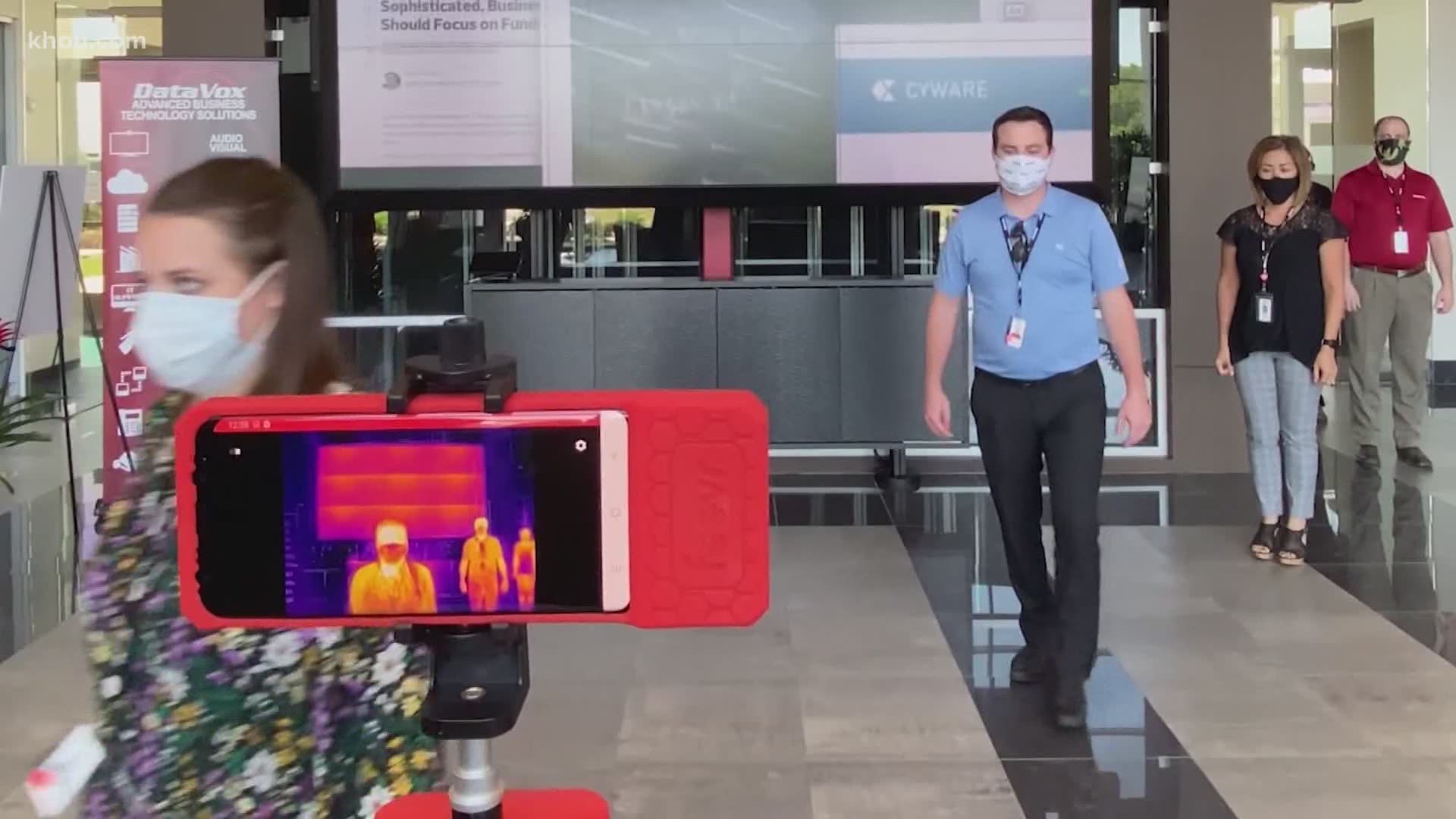HOUSTON — A Houston tech company is trying help as Texas slowly begins reopening.
DataVox has been getting a lot of requests for the thermal imaging camera kits it sells.
"We cannot keep up with the requests. We've had so many people reaching out to us because businesses are wanting to return to work," said Alan Ferguson, DataVox President.
Thermal imaging has been around for years, but during the coronavirus pandemic, it’s taking on a bigger role.
That’s because temperature-taking has become so important in screening for COVID-19.
"In some of the more advanced cameras, as people are coming into the facility, it’s automatically scanning those individuals and checking for elevated temperatures," Ferguson said.
The devices utilize a cell phone and are mounted on a tripod or a wall near a building entrance.
The kits sell for $4,000.
When the device is installed, someone can monitor the camera, or alerts can be sent if someone with a high temperature is detected. The camera focuses on the forehead, but it is not facial recognition technology.
"So we protect the privacy of that person, but you will see a thermal image of that individual," said Mike Bebczuk, DataVox’s Vice President of Building Technology Solutions.
The people at DataVox say these kinds of cameras, and technology that also monitors crowd size, may be the way to go for a while.
"That may become part of our everyday life, just like 9/11 changed the security process at airports," Ferguson said.
Ferguson said one of the largest museums in the Houston area has already placed an order for a number of these cameras as it figures out a way to safely reopen.
Coronavirus symptoms
The symptoms of coronavirus can be similar to the flu or a bad cold. Symptoms include a fever, cough and shortness of breath, according to the Centers for Disease Control. Some patients also have nausea, body aches, headaches and stomach issues. Losing your sense of taste and/or smell can also be an early warning sign.
Most healthy people will have mild symptoms. A study of more than 72,000 patients by the Centers for Disease Control in China showed 80 percent of the cases there were mild.
But infections can cause pneumonia, severe acute respiratory syndrome, kidney failure and even death, according to the World Health Organization. Older people with underlying health conditions are most at risk for becoming seriously ill. However, U.S. experts are seeing a significant number of younger people being hospitalized, including some in ICU.
The CDC believes symptoms may appear anywhere from two to 14 days after being exposed.
Human coronaviruses are usually spread through...
- The air by coughing or sneezing
- Close personal contact, such as touching or shaking hands
- Touching an object or surface with the virus on it, then touching your mouth, nose or eyes before washing your hands.
Help stop the spread of coronavirus
- Stay home when you are sick.
- Eat and sleep separately from your family members
- Use different utensils and dishes
- Cover your cough or sneeze with your arm, not your hand.
- If you use a tissue, throw it in the trash.
- Follow social distancing
Lower your risk
- Wash your hands often with soap and water for at least 20 seconds. If soap and water are not available, use an alcohol-based hand sanitizer.
- Avoid touching your eyes, nose, and mouth with unwashed hands.
- Avoid close contact with people who are sick.
- Clean and disinfect frequently touched objects and surfaces.
- If you are 60 or over and have an underlying health condition such as cardiovascular disease, diabetes or respiratory illnesses like asthma or COPD, the World Health Organization advises you to try to avoid crowds or places where you might interact with people who are sick.
Get complete coverage of the coronavirus by texting 'FACTS' to 713-526-1111.

